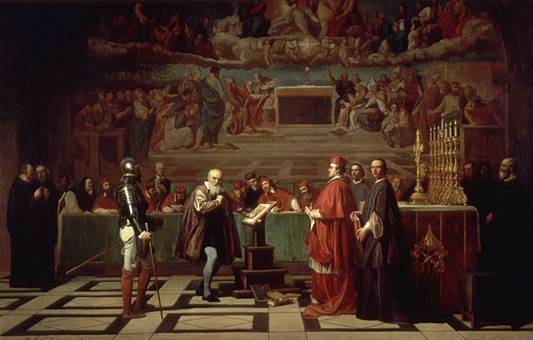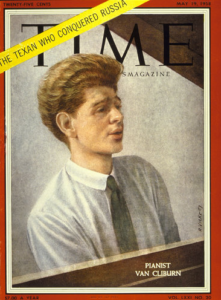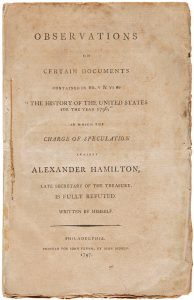February 13, 1633 was the final day of the trial led by the Holy Office. Galileo once again walked into the same dim, candle-lit room in one of the beautiful churches of Rome. The eyes of the paintings, statues, and members of the Holy Office judge him as he entered. He alone was the center of attention. Guards watched over his shoulder, ensuring that he would have to face his fate one way or another. Seeing Cardinal Francesco, Galileo knew there might just be a sliver of hope.1 If he was fortunate, he would be a free man and would finally be allowed to publish his work. But hope was slim for those who speak against the teachings of the Church and expect to get away with it. Galileo was now facing trial for heresy against the Catholic Church, as he was spreading “false” information about the center of our universe with his heliocentric theory.
Astronomer, mathematician, and physicist, Galileo Galilei had quite the knack for stirring up trouble. Born February 15, 1564 in Pisa, Italy, he was not afraid to proudly speak up for what he believed in.2 Just like other scientists, he was passionate about his work. Galileo had become a fierce opponent of the Aristotelian philosophy that dominated the universities, and he openly criticized Aristotle. Since he had never finished college, those who were educated and champions of Aristotle’s philosophy often looked down on him and thought of him as a buffoon.3 This treatment would continue even when Galileo became a professor (without finishing college still). Although it was one of his first experiences being looked down upon, it would not be his last.

First introduced in the sixth century BCE, heliocentric theory claimed that the sun was the center of our universe, directly contrary to the geocentric view that claimed that the earth was its center.4 This heliocentric idea had been discussed among astronomers and philosophers for centuries, but was simply dismissed because of the reigning geocentric view, based on the work of the ancient astronomer Ptolemy. It was not until Nicholas Copernicus published his book De revolutionibus in 1543 that there was a mathematical way to propose this new way of observing our place in the universe. Knowing the dangers of Copernicus’ work, Andreas Osiander included a preface that implied the new system was merely a hypothesis and nothing more.5
So, when Galileo openly claimed to believe in Copernicus’ ideas in 1604, he immediately put himself on the radar of the church.6 Thankfully, he had deep relationships and important friends within the church, especially among various cardinals and priests. More specifically, he was good friends with Cardinal Maffeo Barberini, who often vouched for him with the Holy Office and with Pope Paul V himself.7 Galileo would get away with speaking and teaching the ideas of heliocentrism for now. This time, his relationships kept him from facing condemnation by the church.
Under the motivation from fellow astronomer Johannes Kepler, Galileo decided he would begin to push back at the church.8 Although he was a Catholic himself, he was tired of the church always having the final word.9 He was tired of having to conform his celestial observations to a literal interpretation of the Bible. As a philosopher, he began to think of just how he could find a way around geocentric interpretations of Biblical passages without being seen as attacking God Himself. Knowing he would have to dig deep into the Bible to build a valid argument, he used his contacts in the church to help him once again. With the help of Monsignor Piero Dini and Father Bendetto Castelli, he was able to write various essays in which he essentially argued that the scriptures are meant to teach lessons. The scriptures were true, but oftentimes the imagery of scripture was used simply to convey spiritual meaning, not actually to describe the physical world scientifically.10 Galileo claimed that the Bible, in its entirety, was not meant to be interpreted literally in all places at all times. With his patience running thin, Pope Paul V ordered the Holy Office to begin investigating Galileo. Not even Cardinal Maffeo Barberini could convince the pope otherwise. Galileo would no longer be stirring up trouble, as on February 19, 1616, Copernicus’ De revolutionibus would be banned, and Galileo would secretly be ordered to stop teaching and defending Copernicus in anyway.11 Once again, the church shut down ideas contrary to theirs.
Galileo decided to let his case rest, following the 1616 trial. As much as he had a fire in him to prove his ideas right, he was unable. While he was not formally charged, he was constantly under a microscope. Galileo had to be careful of what he taught and wrote.12 Especially with Pope Paul in charge, there was not much he could do. Being as smart as he was, Galileo knew that hope was not lost. Since he was not formally punished, all he had to do was play the waiting game. Eventually, Pope Paul would have to step down or pass away, and Galileo would then be in the clear. Anxiously, he waited until he could finally begin working on his ideas again.

After waiting seven years, Pope Gregory XV died and his old friend Cardinal Maffeo Barberini was elected Pope in 1623. The waiting game had finally paid off for Galileo, or so it seemed. Knowing Galileo’s troublesome nature, Pope Urban VIII (Maffeo) called Galileo to Rome to have a few meetings with him. Ecstatic over his new-found opportunity, Galileo rushed to Rome to get the green light from him. He would then have six different meetings in which Galileo would try to get a pass, but Pope Urban would not give him one. Despite this, Pope Urban told Galileo that as long he kept his work theoretical, as Copernicus had, he would not have issues with the church any longer.13
With his motivation back, Galileo decided to ignore the warnings of his friend. He would spend the following six years working on the mathematical proof demonstrating that the earth was not the center of the universe. After being silenced for what was an eternity, Galileo refused to be silenced any longer. In January of 1630, his hard work paid off as his book was finally completed.14 Titled Dialagoue of the Two Chief World Systems, publication was the only step left. While the final copy was being worked on, Father Castelli informed Galileo of an old conversation he had with Pope Urban. During the 1616 trial, Pope Urban (then a cardinal) told Father Castelli that if he were pope, Copernicanism would never have been banned. The recent conversations Galileo had had with the pope ran fresh in his head and to him, this was a sign that he would be able to get away with publishing his work. On top of this, he also learned he was also well liked by the Pope’s theologian Nicolò Riccardi.15 Everything was finally falling into place for the hard-headed astronomer.
Yet, publishing his book would be troublesome on his own. Even though he was only informally punished back in 1616, his troublesome reputation stuck with him. Printing Galileo’s findings would be risky even for the most reputable printer. To get his book printed, Galileo would include a “submission clause” giving the illusion that he was in line with the church’s orders in the introduction and conclusion. It took another two long years to finally get his book published.16

Galileo had finally accomplished his goal of circulating his work. His already household name now guaranteed himself a place in history books. As beloved as he was by many of the high church members, a few were set to get him to quit his actions. Someone had convinced Galileo’s dear friend Maffeo that he was trying to embarrass him by publishing his work.17 Once again, he found himself in Rome facing trial. Already let off with a warning, hope was beginning to look bleak for the astronomer. His friends could no longer help him as a prominent subgroup of the church were out for Galileo’s head. Not even Cardinal Francesco (nephew of the pope) who wanted Galileo to once again be free, could change a thing. Anything less than condemnation would not be tolerated.
His enemies’ success came on February 13, 1633, as Galileo was officially condemned.18 His work would be placed on the list of banned reading. On top of this, he was sentenced to house arrest for the rest of his life. Here he continued to accept secret visitors against the orders of the church and further his scientific work. He passed away in Florence, Italy on January 8, 1642. The church had finally silenced the cunning astronomer.
As much as it seemed that the church got the last laugh, Galileo had the last laugh up in the heavens. Nearly 300 years later, in 1983, Pope John Paul II declared that the church had made an error in condemning Galileo. He essentially used Galileo’s original argument that the Bible does not always describe the physical world, and that the Bible holds both literal and figurative interpretations.19 Galileo never wanted the church to look bad or go against it. He was simply seeking the truth of the nature of our universe. According to Galileo, the truths of scripture, when properly understood, do not conflict with the truths of science.
- Ernan McMullin, The Church and Galileo (Notre Dame: University of Notre Dame Press, 2005), 63. ↵
- Encyclopedia of Science and Religion, 2003, s.v. “Galileo Galilei,” by William R. Shea, 349. ↵
- New Catholic Encyclopedia, 2003, s.v. “Galilei, Galileo,” by J.J. Langford, 59. ↵
- The Gale Encyclopedia of Science, 2008, s.v. “Heliocentric Theory,” by K. Lee Lerner and Brenda Wilmoth Lerner, 2096. ↵
- New Catholic Encyclopedia, 2003, s.v. “Galilei, Galileo,” by J.J. Langford, 59. ↵
- Encyclopedia of European Social History, 2011, s.v. “Galileo Galilei (1564-1642).” ↵
- New Catholic Encyclopedia, 2003, s.v. “Galilei, Galileo,” by J.J. Langford, 62. ↵
- J.L. Heilbron, Galileo (New York: Oxford University Press, 2020), 112. ↵
- Encyclopedia of European Social History, 2011, s.v. “Galileo Galilei (1564-1642),” 113. ↵
- Joseph D. Bryne and Arthur R. Sienburg, “Galileo Willfully Violated the Injections of the Inquisition and was thus Guilty at his 1622 Trial,” The High Middle Ages to the Modern World, no. 3 (2011): 241. ↵
- New Catholic Encyclopedia, 2003, s.v. “Galilei, Galileo,” by J.J. Langford, 61. ↵
- Joseph D. Bryne and Arthur R. Sienburg, “Galileo Willfully Violated the Injections of the Inquisition and was thus Guilty at his 1622 Trial,” The High Middle Ages to the Modern World, no. 3 (2011): 225. ↵
- Encyclopedia of Science and Religion, 2003, s.v. “Galileo Galilei,” by William R. Shea, 62. ↵
- Encyclopedia of Science and Religion, 2003, s.v. “Galileo Galilei,” by William R. Shea, 351. ↵
- Encyclopedia of European Social History, 2011, s.v. “Galileo Galilei (1564-1642),” 113-114. ↵
- New Catholic Encyclopedia, 2003, s.v. “Galilei, Galileo,” by J.J. Langford, 62. ↵
- New Catholic Encyclopedia, 2003, s.v. “Galilei, Galileo,” by J.J. Langford, 62. ↵
- Encyclopedia of Science and Religion, 2003, s.v. “Galileo Galilei,” by William R. Shea, 351. ↵
- Encyclopedia of Science and Religion, 2003, s.v. “Galileo Galilei,” by William R. Shea, 351. ↵



137 comments
Ana Diaz
This was a very interesting article! It is astonishing how much of a grasp the Catholic church had on every aspect of people’s lives in the 16th century, compared to today where there is still a big influence but less so across an entire country. It is also very funny to see how common knowledge (like the sun being the center of our solar system) was such a big scientific breakthrough back then.
Barbara Ortiz
I really enjoyed reading your article. I find the scientific advancements that occurred during this time fascinating, as well as the struggles and opposition with the church intriguing. It is interesting to see that the church felt so threatened by Galileo just seeking the truth about the physical world. He never doubted his faith, but just sought hard science that could shed light on this greater physical world. As you stated at the end of your article that truly scripture and science, “when properly understood” don’t conflict with each other.
Priscilla Leal
Galileo Galilei is such a well known astronomer mentioned in a lot of science books and other educational works but his sad story is rarely mentioned. Gelileos intentions and his love for science during his time must’ve been difficult considering how the main explanation for life and technically for everything was religion. The church’s hesitation and reluctance towards accepting new theories can be said that it held back innovation. Great article overall!
Sofia Perez
Hi Jose, what an amazing article! Galileo is one of the well-known astronomers I have learned about in science class but did not know much about his story until now. After Galileo died, Pope John Paul II declared that Galileo was right and that not everything in the Bible holds literal and figurative interpretation. My favorite part about this article was finding how determined Galileo was to publish his book and he was not afraid to stand against the Church’s views.
Jared Sherer
The author provides very informative detail in this article. Learning about the intelligence of Galileo and his fight against the Catholic Church shows bravery like Martin Luther. The patience Galileo showed in order to present his research about science is resounding and showed great commitment. The author shows a good style of writing and organizes the article in a professional manner. Storytelling was done very well in the article and the author does a good job of presenting his research on the chosen topic in an entertaining style. Galileo was well known for his research in science and telling the truth, and the article points out details of Galileo’s journey and his outcome to becoming very successful. It also shows the truth of the cliche, “it pays to have friends in high places”, since Galileo benefitted from his friendships with several influential people, including the Pope.
Jesslyn Schumann
This was a very eye-opening article about Galileo and how much he went through in order to get his beliefs across the people and churches. The in depth look into his life allowed for the basic knowledge people know about him to be enhanced and supported. This new perspective on his life was very exciting to learn about. Thank you for a wonderful article!
Tony Jarvis
There has been no more retrograde belief system than the Catholic church. They start off on the wrong foot right at the beginning:
Genesis, verse 3
And God said, let there be light: and there was light. And God saw the light that it was good: and God divided the light from the darkness.
And God called the light Day, and the darkness he called Night, and the evening and the morning were the first day.
13 verses later.
verse 16
And God made two great lights: the greater light to rule the day, and the lesser light to rule the night: he made the stars also.
In other words, the sun and the moon. So how the hell did he get the light to light up the day in verse 3 in the first place?
This infantile belief that the bible is the word of God has led to mass human suffering at the hands of the Church for those who had intelligent reasoning. People, quietly, and behind closed doors, debated these anomallies and formed themselves into secret discussion groups. They became the “Invisible College”. Slowly and irrepressibly they formed themselves into well organised groups who are now known as Freemasons.
Daniel Gimena
Good article that gives one of the famous examples of how difficult it was for science and scientists to show the world what was true in nature and in science. After and entire life of battling against the Church and finally being silenced, I think it is very ironic that 300 years later, Galileo’s theory is officially (no one still believed in geocentrism) accepted by the Church. Pope John Paul II used in 1983 Galileo’s original argument that the Bible does not always describe the physical world, holding both literal and figurative interpretations, saying that the Church was wrong. Indeed, as Christian himself Galileo never wanted to denounce the church, he was simply tried to explain the truth of the nature of our universe.
Andrea Ramirez
Wow, Jose!! What a good article.
I really liked the way you told the story, I can really appreciate that you did a very deep investigation of the life of Galileo Galilei.
Also, I really liked how you opened the topic of your article, that is, your introduction really caught my attention.
I think I felt very identified when you mentioned that Galileo was tired of the church having the last word, because, to tell the truth, I also get quite frustrated. In fact, it is sad to see how the greatest minds were silence by the church and the difficulties they had to face in order to demonstrate their talents and their ideas to the world.
A fact that I had no idea and, that seemed surprising to me, is that Galileo never finished university.
Good job.
Adam Alviar
This was a very interesting read to become informed of. Although I think it was an quite an awful outcome of what happened to Galileo, as he was taking a step further into science, and got killed for it. I really believe Galileo could’ve helped pushed us farther in the literature of science if the church weren’t so free with power.